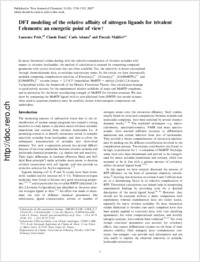DFT modeling of the relative affinity of nitrogen ligands for trivalent f elements: an energetic point of view
- Petit, Laurence Laboratoire de Reconnaissance Ionique, CEA-Grenoble, France - Laboratoire dElectrochimie et de Chimie Analytique, Ecole Nationale Supérieure de Chimie de Paris, France
- Daul, Claude Département de Chimie, Université de Fribourg, Switzerland
- Adamo, Carlo Laboratoire dElectrochimie et de Chimie Analytique, Ecole Nationale Supérieure de Chimie de Paris, France -
- Maldivi, Pascale Laboratoire de Reconnaissance Ionique, CEA-Grenoble, France
-
04.07.2007
Published in:
- New Journal of Chemistry. - 2007, vol. 31, no. 10, p. 1738-1745
English
In many theoretical studies dealing with the selective complexation of trivalent actinides with respect to trivalent lanthanides, the method of calculation is assessed by comparing computed geometries with crystal structures that are often available. Yet, the selectivity is better rationalized through thermodynamic data, as enthalpy and entropy terms. In this article, we have theoretically modeled competing complexation reactions of [Ce(terpy)₃]³⁺, [U(terpy)₃]³⁺, [Ce(MeBTP)₃]³⁺ and [U(MeBTP)₃]³⁺ systems (terpy = 2,2′:6′2″-terpyridine; MeBTP = methyl-2,6-di(1,2,4-triazin-3-yl)pyridine) within the framework of the Density Functional Theory. Our calculations manage to qualitatively account for the experimental relative stabilities of terpy and MeBTP complexes, and in particular for the better coordinating strength of MeBTP for trivalent uranium. We also show by comparing the MeBTP ligand with its non-alkylated form (HBTP) that model systems often used in quantum chemistry must be carefully chosen when energetic comparisons are undertaken.
- Faculty
- Faculté des sciences et de médecine
- Department
- Département de Chimie
- Language
-
- English
- Classification
- Chemistry
- License
- License undefined
- Identifiers
-
- RERO DOC 8653
- DOI 10.1039/b706332f
- Persistent URL
- https://folia.unifr.ch/unifr/documents/300472
Statistics
Document views: 109
File downloads:
- daul_dmr.pdf: 162
